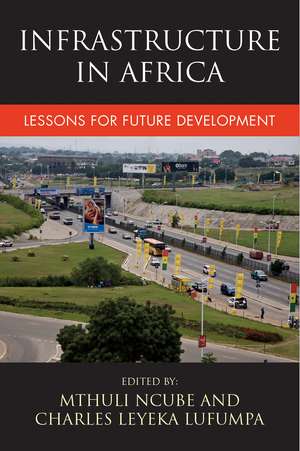Infrastructure in Africa: Lessons for Future Development
Editat de Mthuli Ncube, Charles Leyeka Lufumpaen Limba Engleză Paperback – 30 mar 2017
This book presents a comprehensive account and analysis of the current state of infrastructure in Africa with an unprecedented level of detail. Covering nearly twenty specific topical issues for the ongoing development of African infrastructure—including the economic and political aspects of infrastructure development, financing and the mobilization of domestic resources, and the potential for social inclusion—the volume explicitly challenges current policy, practice, and thinking in this area.
| Toate formatele și edițiile | Preț | Express |
|---|---|---|
| Paperback (1) | 429.65 lei 22-36 zile | |
| Bristol University Press – 30 mar 2017 | 429.65 lei 22-36 zile | |
| Hardback (1) | 949.83 lei 43-57 zile | |
| Bristol University Press – 30 mar 2017 | 949.83 lei 43-57 zile |
Preț: 429.65 lei
Nou
Puncte Express: 644
Preț estimativ în valută:
82.22€ • 85.32$ • 68.72£
82.22€ • 85.32$ • 68.72£
Carte disponibilă
Livrare economică 24 februarie-10 martie
Preluare comenzi: 021 569.72.76
Specificații
ISBN-13: 9781447326649
ISBN-10: 1447326644
Pagini: 500
Dimensiuni: 152 x 229 x 43 mm
Greutate: 1.09 kg
Editura: Bristol University Press
Colecția Policy Press
ISBN-10: 1447326644
Pagini: 500
Dimensiuni: 152 x 229 x 43 mm
Greutate: 1.09 kg
Editura: Bristol University Press
Colecția Policy Press
Notă biografică
Mthuli Ncube is professor of public policy at the Blavatnik School of Government, University of Oxford. He was previously chief economist and vice president of the African Development Bank in Tunisia, where Charles Leyeka Lufumpa is director of the Statistics Department.
Recenzii
“With continued interest from foreign investors and the regional appetite for public-private partnerships, Africa is poised to ride out the oil crisis and meet its infrastructure development goals. This book addresses some of the pressing issues of African infrastructure.”
“Everybody agrees that Africa has an infrastructure deficit, but there is less agreement on how it should be filled, which sectors to prioritize, at which level, and how it should be financed. This comprehensive and wide-ranging book addresses all these questions, contributing both rigor and balance to the debate.”
“As Africa’s population doubles in the next two decades, it is vital that infrastructure keeps up, or stays ahead. Transport, sanitation, water, electricity, communications technology, and social infrastructure are all vital to ensure flourishing communities across the continent. This book spells out that the development of each is challenging but within reach.”
“Connectivity in terms of physical and financial system infrastructure is indispensable in realizing the full benefits of regional integration and wider development of Africa. This book provides much needed ample insight into the conundrum of infrastructure development on the African continent.”








